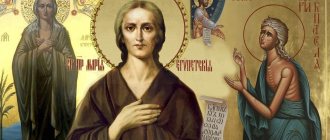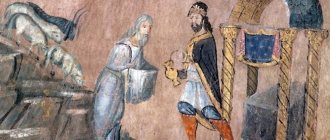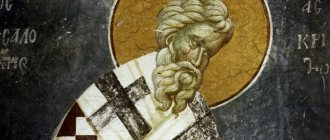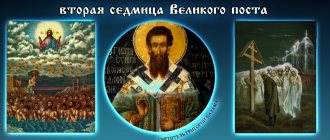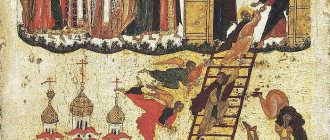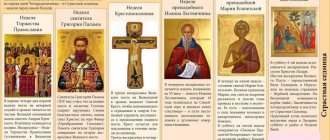Why are services long?
The period from the first week until the sixth Friday inclusive is called Holy Pentecost and is exactly 40 days. The seventh week is called Holy Week and stands out separately. The first fast service falls on the evening of the so-called Forgiveness Sunday , since the church day begins in the evening.
Church services of Lent differ primarily in their duration. Their goal is to set a person in a repentant mood, to prepare the soul for the meeting with the Risen Christ. This is achieved through intense prayer.
During the evening service of Great Lent, Great Compline is served instead of Small Compline. At Matins, the usual canon to the saint is replaced by three songs - special canons consisting of three songs. In addition, special hours, Lenten hours, . Proverbs are also heard at Vespers .
Particular attention in Lent is paid to reading the Psalter. This applies to both home and church prayer. During a week in the temple, the entire book is now read twice instead of once.
Prayer of Ephraim the Syrian
During Lent, we often hear the following prayer in church:
Lord and Master of my life, do not give me the spirit of idleness, despondency, covetousness and idle talk. Grant the spirit of chastity, humility, patience and love to Thy servant. To her, Lord, King, grant me to see my sins and not condemn my brother, for blessed are you forever and ever. Amen.
The words of this prayer belong to the holy ascetic desert of the 4th century - St. Ephraim the Syrian. It is read on days of fasting not only in church, but also at home, along with the morning and evening rules. In this case, the recitation of the prayer is accompanied by a large number of bows.
It should be said that the abundance of bows is one of the main features of the services of this fast. Prostrations are made by believers not only during the prayer of Ephraim the Syrian, but also at other moments of the services. This rule does not apply only to Saturday and Sunday services.
The triumph of Orthodoxy is the triumph of common sense
In this name, the Church preserves the memory of the victory over the heresy of iconoclasm, the essence of which was the denial of the veneration of icons. In 730, the Byzantine emperor Leo III the Isaurian banned the veneration of icons. The result of this decision was the destruction of thousands of icons, as well as mosaics, frescoes, statues of saints and painted altars in many churches. Iconoclasm was officially recognized in 754 at the so-called Iconoclastic Council with the support of Emperor Constantine V Copronymus, who severely attacked Orthodox icon worshipers, especially monks. In their cruelty, the iconoclastic persecution was comparable to the persecution of the Church by the pagan emperors Diocletian and Nero. According to the chronicler Theophan, a contemporary of these sad events, the emperor:
“...he killed many monks with blows of whips, and even with a sword, and blinded countless numbers; some had their beards smeared with wax and oil, then the fire was turned on and thus burned their faces and heads; He sent others into exile after many torments.”
The fight against icon veneration lasted for almost a century, and only stopped in 843, when, on the initiative of Empress Theodora, a council was convened in Constantinople, at which it was decided to restore the veneration of icons in the Church. After the council condemned the iconoclast heretics, Theodora organized a church celebration, which fell on the first Sunday of Lent. On that day, the patriarch, metropolitans, abbots of monasteries, priests and a huge number of lay people openly took to the streets of the capital with icons in their hands for the first time in many decades. Empress Theodora herself joined them. In memory of this event, every year on the first Sunday of Great Lent, the Orthodox Church solemnly celebrates the restoration of icon veneration, called the Triumph of Orthodoxy.
The penitential canon of Andrei Kritsky
From Monday to Thursday of the first week of Holy Pentecost, a special service is held in the evenings with the reading of the Penitential Canon. This is one of the most outstanding works of church hymnography, written by St. Andrew, Archbishop of Crete. In general church use, the canon was already known in the 10th century.
Why was this work called Great? This name is due not only to its large size (the canon is divided into four full parts), but also to the abundance of thoughts, comparisons and allusions from the Old and New Testaments.
The general mood of creation reflects the state of the soul, which bitterly mourns its sins. The same repentant mood is conveyed by the repeated refrain: Have mercy on me, O God, have mercy on me . On Thursday of the fifth week of Great Lent, at Matins, the canon of St. Andrew of Crete is read in its entirety at one time.
This service was called “Standing of Mary” in honor of the memory of the Venerable Mary of Egypt, which takes place this week. At the same time, the life of the holy ascetic, who spent forty years in the desert, is read in the temple. This service is the longest of all church services and lasts approximately five hours.
Books
| Book | Civil font | In Church Slavonic | ||
| In DOC format | In PDF format | In DOC format | In PDF format | |
| Lenten Triodion | ||||
| Canon St. Andrey Kritsky | ||||
| Sunday services of the Lenten Triodion | — | — | — | |
| Holy Week. Divine services | ||||
For documents in doc format in Church Slavonic, use fonts from the Triodion Ucs family, you can download it here - .rar archive. Unpack the archive and install the fonts.
Specifics of Lenten Liturgies
Another of the main features of Lenten services is that full Liturgies are not served in the church on weekdays. The only exception is for the Feast of the Annunciation, if it falls during the week. What is the reason for this specificity?
The fact is that Lent implies some limitation of a person in things that are joyful and pleasant for him. And this applies not only to physical oppression, but also to mental oppression. Of course, the main spiritual joy for a Christian is the Eucharist (communion), celebrated during the Divine Liturgy.
The full Liturgy is not celebrated so that we can re-evaluate this gift of God to man and have time to “hungry” for it. However, even here a small concession was made for the believers. Another feature of Lenten services is that on Wednesdays and Fridays, instead of the full Liturgy of the Presanctified Gifts, the Liturgy of the Presanctified Gifts .
Already from the name you can understand that people can partake of the pre-consecrated saints of the Body and Blood of Christ, which are usually prepared on Sunday. Such a Liturgy is never served again in the year.
Liturgies are celebrated in full rite on weekends. Moreover, on Sundays of Lent, in addition to Palm Sunday, the Liturgy of St. Basil the Great . It takes place only ten times a year. It differs from the Liturgy of John Chrysostom in the more extensive and deeper content of the secret prayers of the Eucharist, read by priests at the altar.
Special days
During Lent, there are days marked by special services, which Christians strive to attend. First of all, this is, of course, the Week of the Worship of the Cross - the third Sunday of Great Lent, when the decorated cross of Christ is solemnly brought into the middle of the church for the worship and strengthening of fasting Christians. The service of this day and the All-Night Vigil the day before are dedicated to the remembrance of the Passion of Christ as a reminder, almost in the middle of Lent, of what we are moving towards, that Holy Week will crown Great Lent. The end of the 3rd Week of Lent is already the time when Christians get tired of physical and spiritual stress. Worship of the Cross strengthens the strength of those who are tired and encourages those who have had time to relax and forget about their initial zeal and the promises that we made to God during the 1st Week of Lent.
A highly anticipated service is St. Mary’s , on Wednesday evening during the 5th Week of Lent. This service received such an informal name due to the unusual for the usual course of the service insertion of the reading of the life of the Venerable Mary of Egypt . The narration of the life of this amazing saint convinces us that no fall, even the lowest, is an obstacle to repentance in the true sense - decisive hatred of previously committed sins. St. Mary's standing is also one of the longest services, since the Great Penitential Canon of St. Andrew of Crete is read in full at it. Thus, for those who missed it in the 1st Week, this is a chance to still hear the greatest liturgical service of the Christian Church.
In the last sixth week of Lent, on the eve of the Feast of the Entry of the Lord into Jerusalem (Palm Sunday), the resurrection of the righteous Lazarus is commemorated; this day is called Lazarus Saturday . Lent is over, the priests' clothes change from dark to light for one day. And the joy of this holiday is felt by Christians through a special feeling, which could be called anticipation. On the eve of Lazarus Saturday, on Friday evening, Sunday hymns are partially sung, and although the main week of Lent, Passion, is still ahead, we already, like the ancient Jews once, understand Who came to us... Only God. This is not yet a final victory over death, but a firm assurance that our last enemy will soon be defeated.
After Lazarus Saturday is the beginning of that period of church life, from the Entry of the Lord into Jerusalem to Easter, which in itself is our whole life. During Holy Week we experience everything: from the jubilation of Christ’s meeting in Jerusalem to the betrayal, torment and death of the Savior and the mysterious Holy Saturday. It is impossible to prepare for this; it must be experienced together with the entire Church. However, next time we will still try to talk about some of the liturgical features of Holy Week.
Newspaper "Saratov Panorama" No. 10 (938)
Lent memorial services
Three Saturdays of Great Lent in a row, starting with the second, are called parental memorial Saturdays . On these days, the funeral Liturgy of St. John Chrysostom and the Great Requiem Service are served. On the eve of Friday, a parastas is performed (funeral evening service with the reading of the 17th kathisma).
These are days of special remembrance of the dead. Such services are motivated by the fact that on weekdays of Lent there is no church commemoration of the departed, since the full Divine Liturgy is not celebrated. In order not to deprive our families of the Church’s prayers for them these days, parental memorial Saturdays were established.
Sunday passions
On the days of Holy Pentecost, another exceptional divine service is celebrated - Passion. It is served on four Sundays, from the second to the fifth, during the days of fasting. Passion came to us from the same place where the black vestments of the priesthood came from - from the West. From Latin “passion” is translated as “suffering” .
This service is not in the church charter, so its content may vary in different churches. The following of the passion has reached us in the form in which it was compiled in the middle of the 17th century by Metropolitan Peter (Mogila). In fact, this service is the evening service of Lent on Monday. At the same time, an akathist to the Cross or Passion of the Lord is served.
The obligatory part is reading a passage from one of the Gospels about the Passion of Christ. Hence the number of passions in a year - according to the number of four evangelists. After the service, a sermon must be preached, for which the clergy carefully prepares.
Week of the Cross
Among other features of the services, one cannot fail to mention the third Sunday of this Lent. At the all-night vigil of this day, the Cross is brought out for worship by believers. At the same time the chant is sung:
We worship Your Cross, O Master, and we glorify Your holy resurrection.
The end of the third week marks the middle of Lent; half the journey has been completed. The cross is brought out to believers to strengthen the strength of those fasting, so that it is easier to go the rest of the way. Moreover, this tradition has its roots in Byzantium.
As you know, previously baptism was accepted there exclusively on Holy Saturday, before Easter. To strengthen the strength of the catechumens (preparing for baptism), the Cross was carried out in the middle of Lent. He remains in the temple until Friday, which is why the fourth week is also called “Worship of the Cross .
"Praise to the Blessed Virgin Mary"
Completely separate from all services is the so-called “Saturday of Akathist” , or “Praise of the Most Holy Theotokos” . It takes place on the fifth week of Holy Pentecost. At Matins, the akathist to the Mother of God “Rejoice, Bride of the Bride” .
This is the first and only akathist established by the Church Charter. It was written in honor of the protection of Constantinople by the Most Holy Theotokos from the invasion of foreigners in 626. To perform the service, the priests on this day go to the middle of the temple. The Akathist is read in parts, four times. After each part, a kontakion (short chant) is sung to “The Chosen Voivode” and the temple is censed.
In its atypical festivity for Lent, “Saturday of the Akathist” is similar to the Annunciation. And only in honor of the Most Holy Theotokos are two such great exceptions made during Lent.
As you can see, guard services have a huge meaning and diversity. In the last, Holy Week, they are even more spiritually saturated. This should be discussed separately. However, it makes sense, if possible, not to miss any of the most important services during Lent, because they will not be repeated this year.
Friday of the 1st week, morning. Selected services of the Lenten Triodion - services of Great Lent.
ON THE FRIDAY OF THE FIRST WEEK, AT MATTNS
Trinity. According to the first verse we say sedalnya Krestnyya Osmoglasnik, and Theotokos.
According to the 2nd verse of the sedals of Mr. Joseph, tone 2. Similar to: Good-looking Joseph:
Through Your passions give dispassion to everyone, O Lover of mankind, / having mortified the passions of my flesh with the Divine Cross, / making it possible to see Your holy Resurrection, Lord.
Slava, too:
And now, the Mother of the Cross: By the honorable Cross of Thy Son we preserve, / Our Lady, the Pure Mother of God, / every challenge of a fighter, we conquer every opportunity, / and we also please You in duty, / like the Mother of God this, / and the only hope of our souls.
According to the 3rd verse of the sedals of Mr. Theodore, tone 2. Similar to: Mercy of the essence:
This is a source of purity, / keep us always, O Merciful One, / look upon us who fall upon You, / attend to the lifting of our hands, / Thy outstretched hands on the Tree, / we crucify for all earth-born, / incorporeal, eat not Lord.
Glory, too.
And now, Holy Cross. It’s like: Your Virgin and Mother, O Christ, / on the Tree seeing You prostrate dead, / crying to the mountaineer: My Son, - the verb, / - what is this terrible sacrament? / Grant eternal life to everyone, / by your will on the Cross, how do you die / to death by diarrhea?
Canon in Menaion 6. And the three songs according to their order. We also usually verse the fifth song, tone 2. Song 5.
Irmos: Enlightenment in the darkness of those who lie, / salvation of the desperate, Christ, my Savior, / to You in the morning, King of the world, / enlighten me with Your radiance, / I know no other god than You.
In vain is sin in me, the flattering wise one, / hastens and promotes sin: / for he truly rejoices over my destruction, / but You grant me correction, O Savior, / for his murder, I pray.
The conqueror of darkness began on Your Cross, / take away these atrocities from me, who have fallen into the depths of sin, / and into the pit of placeless deeds, / I hope to be saved by Your grace.
Having been slain on the Cross, I prostrate myself, / revive my soul, mortified by sin, / and achieve Your honorable Resurrection, / in peace, O Lord Christ, / diligently working for Your justification.
Theotokos: Enlightenment of my weakness, / salvation of my darkened soul, Pure One, / save me, save the perishing Maiden, / and in the robe of incorruptibility clothe me, / corrupted by my cruel sins.
Different, same voice.
Irmos: Nights past:
You deigned to be crucified on the spot with your forehead / in your flesh, the only Immortal One, / immortalizing the human race and imagining it, Lord.
Thy passion is vexed, the creature sees / all changed, O Lord, / the weeping murders of the Jews, / but thou hast endured to save all things.
Glory, Trinity: O All-Holy Trinity! / You are our service, / You are both refuge and power, / in Nature alone you sing Your praises, / the cleansing of sins has come down.
And now, the Mother of God: Many-named Youth, Rejoice, Mother of God, / ark, and camp and table, / luminous candlestick, fiery bush, / crowned city of God.
Glory to Thee, our God, glory to Thee.
Let us rejoice at the world and those in the world, / now, like Christ, we are crucified, / let us endure vexation, reproach, / and other things, so that we may be glorified with Him.
Irmos: The night is past, the day is drawing near, / and the Light of the world has risen, / for this reason the angels praise you, / and everyone praises you.
Song 8.
Irmos: Into the fiery furnace of the Jewish youths who descended, / and the flame in the dew of the Lord, / sing, do as the Lord, / and exalt to all ages.
Having humbled Yourself, You ascended to the Cross for your goodness, / Sometimes you exalt the fallen food of the tree, / Moreover, You, the only Most Good One, / glorified One, we sing for ever.
Inattention, through the slumber of sin, a heavy sleep has risen, / but you who have fallen asleep on the Cross for my sake, my Christ, / raise up the fallen me, / so that the night of death will not accept me.
Having been blinded by sweets, I envelop my darkened soul, / and the flattering and wise enemy laughs in vain at me, / and enlighten me, and deliver me from this malice, O Christ, forever.
Theotokos: I have spent life in laziness, / the slumber of sin weighs heavily on my soul, / I flow to Thy incessant prayer, / do not let me in death, O Most Pure Virgin, fall asleep.
Other.
Irmos: In the bush to Moses:
Crowned with thorns, and wrapped in a robe of purple, / you appeared, the most red, O Christ, with kindness / more than all the sons of men, adorned with glory.
Bile and drink pour out, / pouring out two streams, life and incorruptibility, / from Your Divine ribs, to those who sing to You by faith, / and glorify You, O Christ, to all ages.
Let us bless the Father and the Son and the Holy Spirit, the Lord.
Trinitarian: The Divinity is one Trinity, / an indivisible Nature, but separate Persons, / an undying power, Father, Son and Soul, / We praise Thee throughout all ages.
And now and ever and unto ages of ages, amen.
Theotokos: Pure Mother of God, / heavenly door, saving gate, / accept the prayers of all Christians, / blessed to you forever and ever.
Glory to Thee, our God, glory to Thee.
Cross of the scepter of Christ, Church of the horn, / kings of victory, guardian of Christians, / you are my enlightenment, / you are my praise forever.
We praise, we bless, we worship the Lord, singing and exalting ourselves to all ages.
Irmos: In the bush of Moses, the Virgin miracle, / on Mount Sinai, who sometimes typified, / sing, bless, / and exalt to all ages.
Song 9.
Irmos: Even before the Sun, the Lamp of God rose, / came to us carnally, / from the side of the Maiden indescribably embodied, / Blessed All-Pure, / We magnify You, Mother of God.
My leprous soul with placeless thoughts, / by the sprinkling of Thy blood, cleanse, O Word of God, / and make me a sharer of Thy glory, / for my sake, Christ, who endured inglorious things, was crucified this.
I am all wet with the burden of Christ’s placeless deeds, / and lamenting I call upon You, O Lover of Mankind: / my soul’s inhealable ulcers / heal with Your honest blood, / let me sing to Your Divinity.
I eat malice, and drink carelessly, / I remain uncorrected in everything, / I rejoice untimely in eating food, / because the Lord does not say anything about fasting.
Theotokos: The fierce destroyer of ancient renunciation, / and the foremother of correction, / the generation to God of appropriating the wine, / to the Creator the bridge, / We magnify you, the Mother of God.
Other.
Irmos: Pure and Most Pure:
On the Tree you will crest the creature, wavering, / this God suffered carnally, / for the goodness of generosity, so that you may save us.
Your Cross, O Lord, is great power, / for by forming this within ourselves, / we reflect the strength of the demons.
Glory, Trinity: To the Trinitarian Unit, the only Trinity, / the Lord, the Equal-Glorious Nature, / the Father, the Son, and the Divine Soul, / save us all.
And now, Mother of God: Rejoice, purifier of the world, Mother of God, / in whom all sins flow, / we always find reconciliation with God.
Glory to Thee, our God, glory to Thee.
Your Cross, Lord, / Strengthen me with Divine power, / Offer the immaculate and pure time of fasting to You.
Irmos: Pure and Most Pure / Mother and Virgin / with songs of songs, all the faithful, / piously, like the Mother of God, we magnify.
Luminous voices.
The poem is self-vocal, twice, tone 8:
Let us joyfully accept the Lenten testament, / Even if the forefather had preserved this, / We would not have accepted the fall of Eden. / Red in vision, and good in food, / the fruit that kills me, / let us not admire things, / let our throat delight in the revered food, / when received by the dishonored. / We run from intemperance, / and when we are filled with passion we will not submit. / We are marked by the blood, / we are led to death by the will, / and the destroyer will not touch us, / and we celebrate the most sacred Pascha of Christ, / for the salvation of our souls.
Martyr: What shall we call you saints? / Or cherubim, for Christ rested upon you. / Are you Seraphim, as you constantly glorify Him. / Are you angels, for you turn away from bodies. / Are you strong, you work miracles. / Many are your names, and great gifts, / pray for our souls to be saved.
Glory, and now, the Holy Cross, the voice is the same. Similar to: O glorious miracle!
As we see You crucified on the forehead, O Savior, / the whole creation has changed, / and the trembling movement cannot endure. / But the Pure Virgin and Thy Mother, / crying out to Thee: / woe is me, O My Child, My sweetest Savior, / what is this new and glorious and strange vision?
There is goodness: and other things that follow. Hour 1 without poetry: likewise on other heels of the great saints of the 40th.
AT THE 6TH HOUR
Troparion, tone 5:
Our many-sinful life, / and unrepentant disposition / are preceded by generosity, Lord, / for You know no other, / dominant in life and death, / save as the Lover of Mankind.
Glory, and now: and we repeat the same.
Prokeimenon, Psalm 17, tone 7: I will love You, O Lord, my fortress, / The Lord is my strength. Verse: My God, my helper.
Reading the prophecies of Isaiah. [Chapter 3, art. 1 – 14.]
Behold, the Lord Lord of hosts will take away from Jerusalem and from Judah the strong and the strong, the strength of bread and the strength of water. A giant, and a strong one, and a man of war, and a judge, and a prophet, and a watcher, and an elder. And the fifty-leader, and the wondrous adviser, and the wise architect, and the intelligent listener. And I will make young men their princes, and scoffers will rule over them. And people will attack, man against man, and man against his neighbor: the youth will attack the old man, and the dishonest will attack the honest. As a man has his brother, or his father at home, the verb: robe and masha, be our leader, and let my meat be under you. And having answered on that day he said: I will not be your leader, for there is neither bread nor robe in my house: I will not be the leader of this people. For Jerusalem was forsaken and Judah fell, and their tongue with iniquity was not repented of the Lord. For this reason their glory has now been humbled, and the coldness of their faces has been opposed to them: but they have proclaimed their sin like Sodom, and it has been revealed. Woe to their souls, having thought evil advice upon themselves. Rexha: Let us bind the righteous, for we do not need to eat: for they will eat the fruits of their deeds. Woe to the wicked, for the evil one will befall him according to the work of his hands. My people, your henchmen reap you, and the tormentors possess you: my people, your blessed ones flatter you, and trouble the paths of your feet. But now the Lord will arrange judgment, and will bring His people to judgment. The Lord himself will come to judgment with the elders of the people and with their princes.
Prokeimenon, Psalm 18, tone 6: The Lord, my Helper, / and my Deliverer. Verse: The heavens tell the glory of God, but the firmament declares His handiwork.
It is known that the following of the Menaion of the saint who came on Saturday and Sunday is sung at Compline, or whenever the Ecclesiarch wishes.
FRIDAY PM
In the lamplight, according to the usual verse, I cried out to the Lord, set verses 10, and sing the stichera, self-according day, twice, voice 5:
Come, faithful ones, / let us do the works of God in the light, / as we walk well in the days, / we will take away every unrighteous reproach from our neighbor, / not counting this stumbling as a temptation. / Let us leave lust for the flesh, / let us increase our souls’ talents, / let us give bread to those who need it, / and let us come to Christ in repentance crying out: / Our God, have mercy on us.
We also sing the four martyrdoms of Octoechos, whose voice came.
The same self-agreement 4, St. Theodore. Voice 2:
Come, all martyrs, / let us rejoice spiritually and triumph, / today the martyr Theodore offers a secret meal, / cheering us idle lovers, even as we cry out to him: / Rejoice, O passion-bearer who is invincible oh, / devastated by the rebuke of the tormentors on the earth. / Rejoice, having given your mortal body to torment for Christ our God. / Rejoice, thou artful warrior who appeared in various troubles of the heavenly army. / We also pray to you, decoration of the martyrs, / pray for our souls.
The God-given grace of your miracles, Martyr Theodore, / you extend to everyone who flows to you by faith, / we praise you, saying: / you deliver the captives, you heal the sick, / you enrich the poor eat and save those who float, / hold back the vain current of the slaves, / and create the manifestation of vanity to those who steal, who suffer, / and the warriors are punished by admiration, to be robbed, / to the baby you mercifully grant petitions, / you find a warm representative for those who create your sacred memory. / With us also, most holy sufferer, / singing of your torment, / asking Christ for great mercy.
You, the martyr Theodora, appeared to be the exceeding gift of God, / before and after your death, as if alive / to those who flowed in with your petitions. / Moreover, my son sometimes admired his wife, / I was captured by the warriors of other faiths, / the widow represented your temple with tears, / but you, as if you were merciful, came on a white horse, / you presented the sowing youth to the nevi dimo: / and for this and with this you work miracles, you have not ceased . / But pray to Christ God that our souls may be saved.
I honor the divine gifts of your namesake, blessed Theodora, / for the light of the Divine never-setting luminary appeared, / through your sufferings you illuminated all creation, / and the strongest fire appeared, the flame of You extinguished, / and you crushed the head of the flattering serpent. / Moreover, in your suffering, Christ bowed down, / crowning your divine head, great martyr who suffered, / as having boldness towards God, / diligently praying for our souls.
Glory, voice 6: The enemy of the apostate tormentor used the vessel, / with a cruel intent, / pious people cleansing themselves by fasting, / from unclean sacrifices, plunging into desecration with defiled broths, / but you cunningly You destroyed the wisdom of the wisest by your intentions, / You appeared in a dream to the then bishop, / and opening the deep mind, / and revealing a placeless undertaking, / and offering thanksgiving to you, we will write to the Savior, / a summer memory of the former, working miracles: / and other prayers, / from the thoughts of the onion Let us be saved unharmed, / through your prayers to God, Martyr Theodore.
And now, the voice of the Mother of God. Entry without the Gospel. Quiet light:
Prokeimenon, Psalm 19, tone 5: The Lord will hear you / in the day of sorrow. Verse: The name of the God of Jacob will protect you.
Genesis reading. [Chapter 2, art. 20 – 25. Chapter 3, art. 1 – 20.]
I will call the names of all the livestock, and all the birds of the air, and every beast of the earth, Adam, but Adam will not find a helper like him. And God put a curse on Adam, and he succeeded: and took one from his side, and made him flesh in his place. And the Lord God created a rib, taking it from Adam, for a wife, and bringing it to Adam. And Adam said: Behold, this day is bone of my bones, and flesh of my flesh: this woman shall be called, for she was taken from her husband. For this reason a man will leave his father and mother and be united to his wife, and the two will become one flesh. And the devils are both naked, Adam and his wife, and they are not ashamed. The serpent is the wisest of all the beasts that are on earth, which the Lord God created. And the serpent said to the woman: Why did God say, Let us not eat of every tree of Paradise? And the woman said to the serpent: We will eat from every tree of Paradise. From the fruit of the tree, which is in the middle of paradise, God said, do not eat from it; touch it, lest you die. And the serpent said to the woman: You will not die. For God knows that even if the day is taken away from him, your eyes will be opened, and you will be like a god, knowing good and evil. And the woman saw that it was a good tree for food, and that it was pleasing to the eye, and that it was red, even to understand: and she took of the fruit thereof, the poison: and gave it to her husband with him, and the poison. And the eyes of both were opened, and they understood that the Nazis were Besha, and they sewed together fig leaves, and made girdles for themselves. And he heard the voice of the Lord God, going into paradise at noon: and Adam and his wife hid themselves from the presence of the Lord God in the middle of the tree of paradise. And the Lord God called Adam, and said to him: Adam, where are you? And he said to Him: I heard the voice of You going to Paradise, and you were afraid because I was naked, and you hid yourself. And God said to him: Who will tell you that you are naked, except from the tree that commanded you, this alone you shall not eat, from which you ate? And Adam said: “Woman, even as you gave with me, you gave to me from the tree, and the food died.” And the Lord God said to the woman: What have you done? And the woman said: The serpent deceived me and killed me. And the Lord God said to the serpent: Because thou hast done these things, cursed be thou from all the cattle, and from all the beasts of the earth: upon thy breasts shalt thou go, and thou shalt carry away the earth all the days of thy life. And I will put enmity between you, and between the woman, and between your seed, and between her seed: her head will watch over you, and you will watch over his heel. And he said to the woman: I will multiply your sorrows and your sighs; in your sickness you will give birth to a child, and you will turn to your husband, and she will have you. And I said to Adam: Because you have listened to the voice of your wife, and you ate from the tree whose commandments you alone shall not eat, from which you ate: cursed is the earth in your deeds, in your sorrowful sleep Thou shalt endure all the days of thy life. Thorns and thistles will grow for you, and you will bear down the grass. By the sweat of your brow you have carried away your bread, until you have returned to the land from which you were taken: as you are the earth, you will return to the earth. And Adam called his wife’s name Life, for she is the mother of all who live.
Prokeimenon, Psalm 20, tone 6: Exalted, O Lord, in Thy power, / let us sing and praise Thy might. Verse: Lord, in Your power the king will rejoice.
Proverbs reading. [Chapter 3, art. 19 – 34.]
God founded the earth with wisdom, but prepared the heavens with understanding. In the feeling of Him the abyss opened up, and the clouds shed dew. Son, do not fail, keep my advice and thought. May your soul live, and may grace be on your neck: [there will be healing in your flesh, and healing in your bones:] May you walk in peace in all your ways, and your foot will not stumble . If you sit down, you will be fearless, and if you sleep, you will sleep sweetly. And do not be afraid of the fear that is found, lower than the aspirations of the wicked. For the Lord will be in all your ways, and will strengthen your foot so that it does not slip. Do not refuse to do good to those in need, when your hand is ready to help. Do not say: when I go, I will return, and in the morning I will give, I am strong enough to do good: do not weigh what the coming day will give birth to. Do not weave evil against your friend, who is a stranger and trusts in you. Do not be hostile to a person, lest he do anything evil to you. Do not earn the reproach of evil men, do not be jealous of their ways. For every transgressor is unclean before the Lord and does not associate with the righteous. The oath of the Lord is in the houses of the wicked: but the courts of the righteous are blessed. The Lord opposes the proud, but gives grace to the humble.
Also, may my prayer be corrected:
And other succession of the high priests.
According to the prayer behind the pulpit
We sing the real prayer canon of St. Theodore. Having offered Kolivo, we say Psalm 142: Lord, hear my prayer: Also, God the Lord, has appeared to us:
And abiye troparion, tone 2:
With the great faith of correction, / in the fountain of flame, as on the water of repose, / the holy martyr Theodore rejoiced: / for he was burnt with fire, / as sweet bread was brought to the Trinity. / Through your prayers, O Christ God, / save our souls.
Glory, too.
And now, the Mother of God: All more than meaning, / all your glorious sacraments, O Mother of God, / sealed with purity and preserving virginity, / Mother knew that you are not false / having given birth to the true God. / Pray to him for the salvation of our souls.
And Abiye Psalm 50.
The same canon, tone 8. The work of John of Damascus, his lines: I sing the gifts of God by your namesake. Song 1.
Irmos: Having passed through water like dry land, / and having escaped the evil of Egypt, / the Israelite cried out: / Let us praise the Deliverer and our God.
You are God’s zealot, Theodore, knowledgeable / and filled with your inevitable love, / I offer my soul and body and words of praise.
The written command is godless, / to offer sacrifice to an idol, and not to the Living God, / but you were brought, do not devour the passion-bearing, / you were brought to be to God.
Glory: By Divine zeal you have been nailed, You have fought the Most High God / The Only Begotten Son, Theodore the Martyr, / and You have not sinned in honor.
And now, Mother of God: You are praised unceasingly by angels and men, Blessed Mother: / You bore the Creator of these, like a Child / in Your arms.
Song 3.
Irmos: You are the affirmation of those who flow to You, Lord, / You are the light of the darkened, / and my spirit sings of You.
Singing from my lips, / and from my painful soul I bring a prayer, / so be generous, passionate Theodora.
Thou hast subjugated the flesh to the Autocrat, the glorious martyr, the mind, / and with both thou hast pleased the Creator.
Glory: You stood at the tormenting judgment, / Christ the King theologized, / for you renounced eating evil, Theodore.
And now, the Mother of God: You are all Christians’ refuge and everlasting wall; / We praise you silently, Brideless One.
Song 4.
Irmos: I have heard, O Lord, / seen Your sacrament, / understood Your works, / and glorified Your Divinity.
Having tasted the Mysteries of the Divine, in your mind, the martyr Theodora, / you confessed the shameless preaching of God’s birth.
Passionate deity Nepshchevahu, serving with passion, / whom you exposed in spirit, / the sufferer Theodora, we enlighten.
Glory: We pray to the Savior through prayer, to you who sing praises, blessed Theodora, / from various circumstances and passions.
And now, the Mother of God: The growing, life-giving Claus, the unearthed field, / giving life to the world, the Mother of God, / saving the singing One.
Song 5.
Irmos: We cry out to Thee in the morning, / Lord, save us, / For Thou art our God, / Dost Thou know no other.
Love the Lord who loved you, / you proclaimed to the sufferer Theodora, / to the martyr who suffered with you.
As your heart was liquefied by passion-bearing jealousy, / you burned the falsely named goddess with a vengeance.
Glory: By invincible power, more passion-bearing Theodora, / barbaric insolence, / and destroy my passions.
And now, Theotokos: Virgin at Christmas we sing Thee, Mother of God, / For you gave birth to the God of the Word in the flesh of the world.
Song 6.
Irmos: Cleanse me, O Savior, / for my iniquities are many, / and bring me up from the depths of evil, I pray, / for I have cried out to You, / and hear me, / God of my salvation.
If it is weak, if it is weak, then the vain gods are reeling! / For their vengeance, praying by man in a standing position to be conquered, / true martyrs preaching the truth. [Twice.]
Glory: Strengthened by the power of God, glory to Theodora to the martyrs, / the torment of the wicked, the infant of shooting has matured, blessed, / foreseeing the eternal future.
And now, Mother of God: May we get rid of cruel sins / through Your prayers, O Pure Mother of God, / and may the All-Pure One receive the Divine radiance, / from You, the ineffably incarnate Son of God.
Kontakion, tone 8:
You have received the faith of Christ like a shield into your hearts, / you have trampled upon the opposing forces, O much-suffering one, / and you have been crowned with the heavenly crown forever, Theodore, as if you were invincible.
Song 7.
Irmos: From Judea came, the youths / in Babylon sometimes / by the faith of the Trinity, trampled upon the fire of the furnace, singing: / God of the fathers, blessed art thou.
You were urinated in body, / for the uranium of the Word in the flesh for our sake, / and for this you cried out in joyful gratitude, the passion-bearing Theodora: / Blessed are you, our father, God.
As if in the tomb you were placed, and by your will you were sealed to the Deliverer of all, in the prison sealed / you dwelt crying out to the passion-bearing Theodora: / our father, blessed are you.
Having been put to death, and having shaken off the passions of the flesh by will, / not from food, passion-bearing, but from Divine love, you sang: / Our father, God, is blessed.
Glory: In the prison of the passion-bearing, like in the cave of the young men sometimes, / One incorruptible Trinity strengthens you, having been seen, crying out: / Blessed be thou our father, God.
And now, the Mother of God: Our salvation, as you desired, the Savior, to arrange, / you entered into the womb of the Virgin, / you showed your representative to the world, / blessed are you, the father of our God.
Song 8.
Irmos: The sevenfold cave of the Chaldean tormentor / furiously enraged the godly, / by the best power of this salvation he saw, / cried out to the Creator and Deliverer: / youths, bless, / priesthoods, praise O people, exalt to all ages.
Blinded by your mind, O ruler of the lawless, / You wickedly despise the godly: / Why did you put your hope in vain on a man who died foolishly? / But you cried out: / children, bless, priests, sing, / people, exalt to all ages.
As an intelligent and wise builder of grace, / by the grace given to you from God, / you cried out to Theodora, who commanded wickedly: / make this cold for me and for those who sing. / Bless the youths, priests, sing, / people, exalt to all ages.
Glory: You labored youthfully, you boldly exposed you: / why are you mad, - you cried to the tormentor, / - commanding the creatures to serve falsely, having abandoned the Creator? / But I sing: O children, bless, priests, sing, / O people, exalt to all ages.
And now, the Mother of God: With carnal images, and various ganiyas, / and significant and illustrative sayings, / Your foreshadowing of the God-speaking Christmas, / natural and wonderful, Virgin, / even so, the joyful pious praise of You let's go, / exalting Christ to all ages.
Song 9.
Irmos: Thy Unartificed Mother of the Most High God:
The substance of your torment is God, Theodore, desire. / In the same way, you and the substance became a material body of fire: / wherefore you went forth to the Divine fire, rejoicing, / the passion-bearing servant of God Theodore.
O most honorable martyr, having fallen, you have not been caught: / for you have fallen under the charm, / but you stand before God alive, / and in Him you rejoice as a martyr, / the passion-bearing and pleasing Theodora.
Glory: We know You alone as Christ, one of the Trinity, / in a double perfect nature, / save Thy people, / who Thou hast acquired with Thy honest blood, / Theodore the passion-bearer said itwami.
And now, the Mother of God: You who bore the embrace of the invisible God, / are sung in heaven with all power: / and by You we magnify the salvation granted to us / in the present day.
Irmos: You, the Unartificed Mother of the Most High God, / Who gave birth to the word of truly God more than the mind, / who is superior to the most pure powers, / We magnify you with non-silent praises.
And abiye, the Trisagion.
And the troparion of the saint, tone 2:
With the great faith of correction, / in the fountain of flame, as on the water of repose, / the holy martyr Theodore rejoiced: / for he was burnt with fire, / as sweet bread was brought to the Trinity. / Through your prayers, O Christ God, / save our souls.
Glory, kontakion, tone 8: You have received the Faith of Christ like a shield into your hearts, / you have trampled upon the opposing forces, O much-suffering one, / and you have been crowned with the heavenly crown forever, Theodore, as if you were invincible dear.
And now, the Mother of God, the same voice: Like the intercession of all, and the sovereign intercession, / sinners of the acquisitive, All-Pure, Your warm help, / Virgin Mother Mary, Christian salvation. / Nevertheless, do not stop praying for us to the Savior, to be granted forgiveness.
And the blessing of koliva happens. Also, be the name of the Lord: and I will bless the Lord: And the refraction is given from the priest. And let go.
And in order not to be pre-sacred, we end our hours with time. According to Oslabi, leave: And finally we bowed to the Trisagion. According to Our Father: Lord have mercy, 12. The same prayer, the All-Holy Trinity: And we begin Vespers: Come, let us worship: three times. Psalm 103. Kathisma. And we sing to the Lord, stichera on 6. Martyrs 3, in the Octoechos, voices like those in the row: And to Saint Theodore, 3, Glory, Theodore: Having used the vessel: And now, the Theotokos, in the voice of the row. Quiet light: no entrance. Reading. On the verse of the Triodion, the day is self-according twice, and martyred, voice 5: Blessed is the army: Glory to Theodora, voice 2: Divine gifts: Written in stichera. And now, the Mother of God: All hope: Now you let go: the Trisagion. According to Our Father: Troparion: Greatness of faith: Glory, and now, to the Mother of God: All more than the meaning: The same litany, God have mercy on us: And bows, 3. And the priest puts on a scarlet veil, and begins: Blessed is our God: And we say a psalm 142: Lord hear the prayer: And so on as stated before. Canon 4. And after completing the canon, Instead of: It is worthy to eat: We sing irmos 9 songs: The Unartificed One: The same Trisagion. According to Our Father: Troparion: Greatness of faith: Glory, kontakion: Faith of Christ: And now, Theotokos: Like intercession: The same prayer over the koliv, blessing of the koliv. Therefore, be the name of the Lord: and I will bless the Lord: And let go. And we enter into the meal, and eat wine and oil, for the sake of the saint. We received this in the monastery of our venerable father Savva, and the monastery of the venerable Great Euthymius, but we do not do this now for the honesty of the day. In both cases, we eat the jam with plums, without butter and armea: those who choose, eat dry food, just like on Wednesday.
It is appropriate to know that at all the heels of the holy and great Pentecost, at Vespers and Compline we do not make bows, only those imaginary in the presanctified, already there, May it be corrected: bows 3. At the entrance of the Holy Gifts, bows 3. And on Be the name of the Lord, bows 3 .
We sing Great Compline, and at them we sing the rest canons of the present voice, in the tomb.
In the Menaion we sing the canons of the real Saturdays and Weeks, whenever the Ecclesiarch pleases: we sing one in the Compline of the Heel, and we sing another canon in the Compline of the Week.
We do this on all heels, on the evening of the Holy and Great Pentecost.
